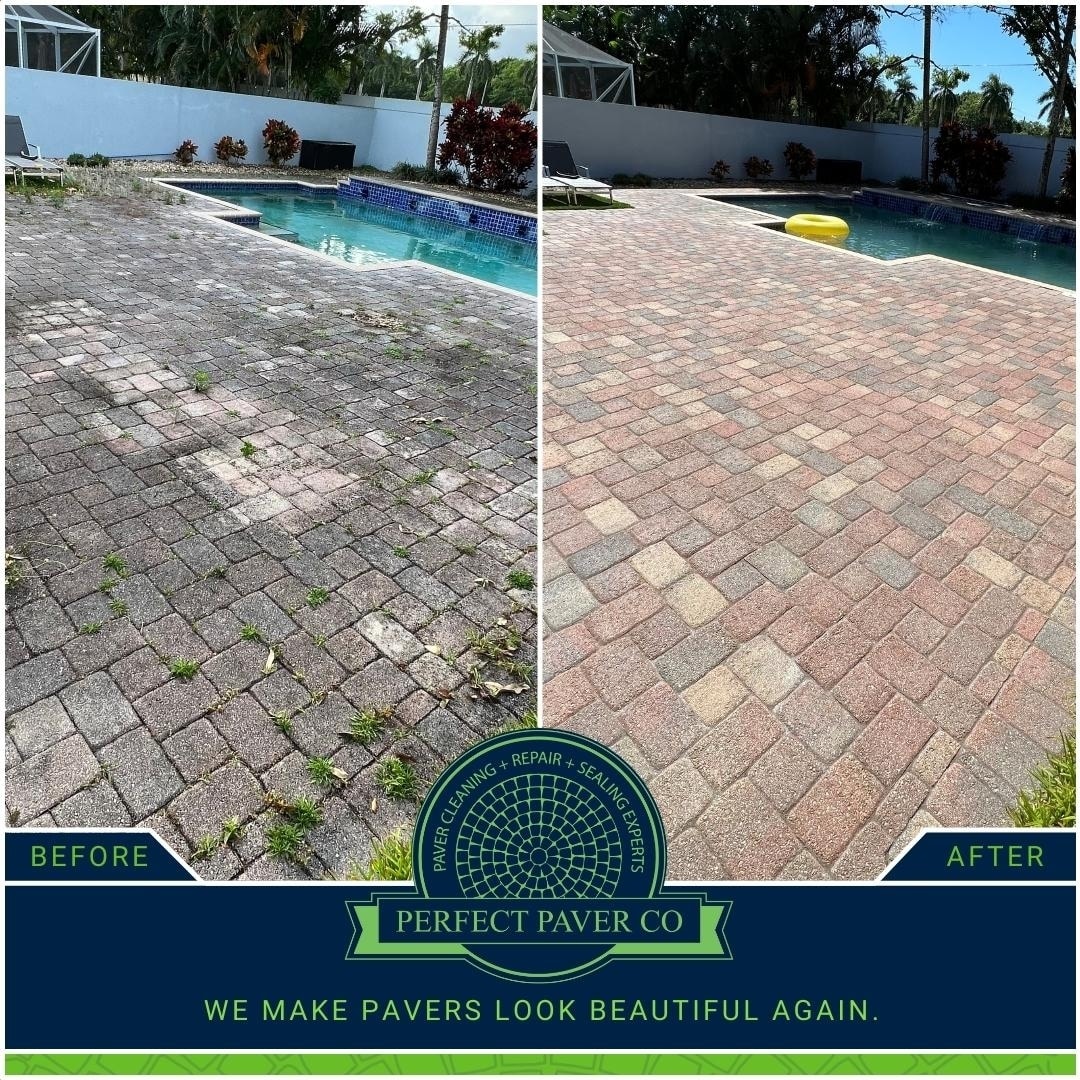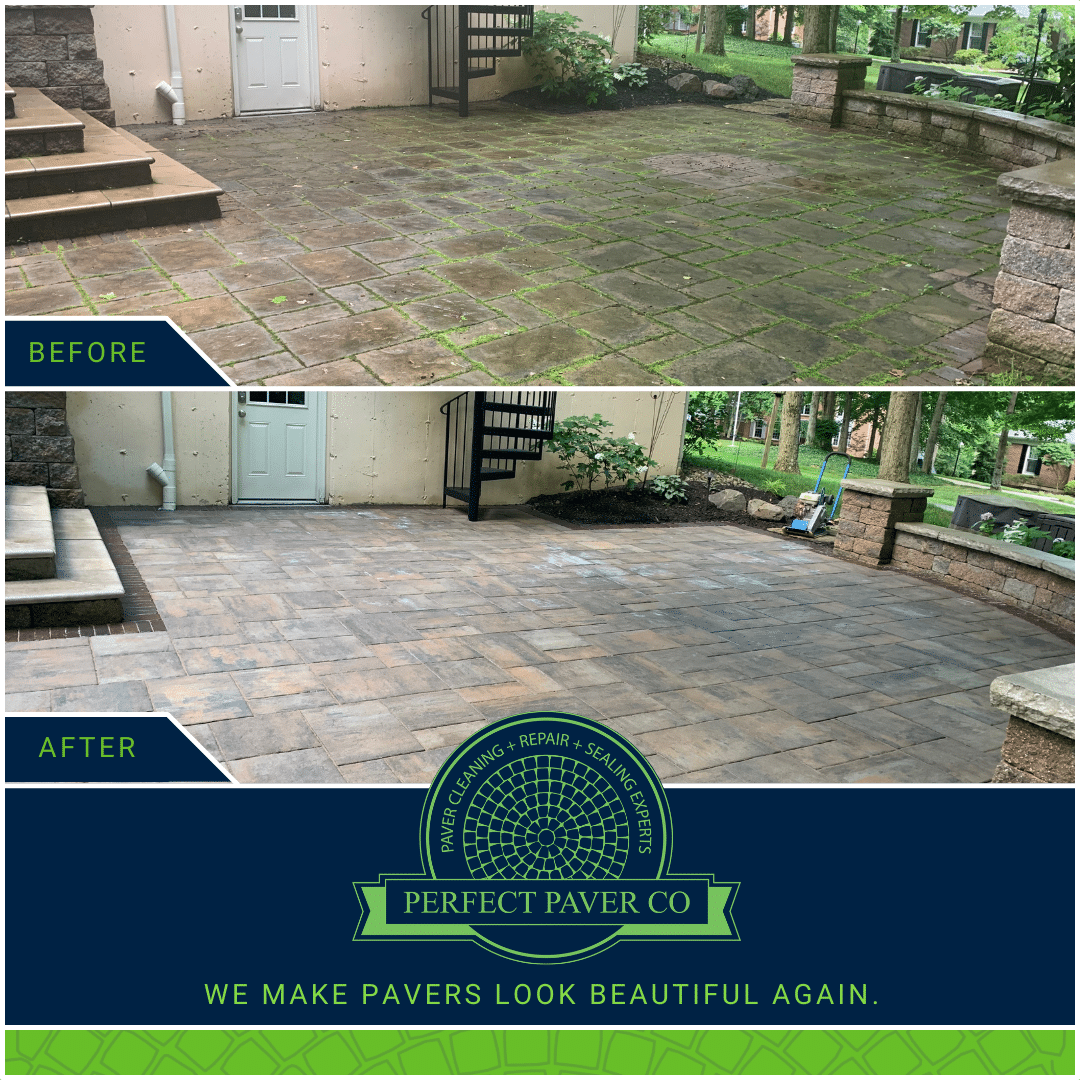Weed growth and persistent dirt on pavers are often signs of underlying issues that go beyond mere surface problems. In this blog post, we’ll delve into the reasons behind these concerns and explore effective solutions to keep your paver patio or driveway pristine.
The Slope Dilemma
Weed growth and excessive dirt on pavers often stem from inadequate slope, such as settling, shifting, or flat surfaces lacking proper drainage. When pavers lack the necessary slope, rainwater accumulates in flat areas, keeping them moist for extended periods. This creates an ideal environment for weed seedlings, carried in by the wind from neighboring plants, to take root and thrive.
Imagine a scenario where rainwater collects on flat pavers, contrasting it with properly sloped pavers where water efficiently runs off. The comparison highlights the importance of proper slope in preventing weed-friendly stagnant water.
To achieve optimal drainage for pavers, it’s recommended to maintain a slope of ¼” for every 1’ of run. However, for smoother pavers without surface textures or beveled edges, a slightly gentler slope of ⅛” for every 1’ of run can be acceptable, given there are no dips present. It’s worth noting that a ⅛” dip over a 1’ area might go unnoticed, but with only an ⅛” slope, this dip could result in a flat area prone to water accumulation. That’s why the industry recommends aiming for a ¼” slope to ensure effective water runoff.
Stuck in the Mud

In areas where settling occurs due to uneven pavers, dampness persists, leading to the accumulation of dirt and debris on the paver surface. Unlike well-sloped areas where rain naturally cleanses the pavers by carrying away dirt, settling areas become a magnet for dirt and debris. The lack of proper slope inhibits nature’s cleansing process during rains, causing dirt to adhere to the damp surface.
Visualize a side-by-side comparison of settling areas with dirty, damp pavers versus clean, well-sloped pavers benefiting from natural rain cleansing. This contrast illustrates the impact of settling on dirt accumulation and the importance of proper slope for maintaining a clean paver surface.
Other Culprits for Weed Infestation
Overgrown Joints and Infiltrated Sand: Over time, paver joints can become overgrown with organic material, providing a fertile ground for weed growth. If your pavers and joints haven’t been thoroughly cleaned in a while, the pores may be filled with organic material, creating an environment prone to weed infestation.
Impeded Water Flow from Landscape Beds or Patio Walls: The presence of mounded landscape beds or patio walls at the edges of your pavers can impede water flow. This obstruction slows down the natural flow of water off the pavers during rain, significantly reducing nature’s ability to cleanse the surface. This interference can lead to increased dirt and debris accumulation.

Full Shade Areas Require Increased Maintenance: If certain sections of your patio or driveway don’t receive adequate sunlight, these shaded areas are more prone to weed growth. In these spots, more frequent maintenance is required to keep pavers and sand joints cleaned off, preventing the accumulation of seedlings, dirt, and debris.
Accumulation of Leaves, Grass, and Organic Debris: In yards with abundant trees or landscaping, leaves, grass, and other organic items can accumulate on the pavers. Failure to remove these regularly results in a buildup of organic material, creating an ideal environment for weed growth.
By addressing these specific factors, you can minimize the conditions conducive to weed growth and ensure the longevity of a clean, well-maintained paver surface.
Conclusion:
When it comes to your pavers, it’s common to worry about weeds and dirt. But instead of just dealing with these surface issues, it’s smarter to fix what’s causing them in the first place.
From water not flowing properly to areas where dirt and debris piles up, these are the real reasons behind those problems. That’s where Perfect Paver Co comes in. We don’t just clean the surface; we can fix what’s underneath.
Our services, like repairs, cleaning, using polymeric sand, and sealing, make sure your pavers stay nice for a long time. We don’t just deal with the symptoms; we solve the real issues.
After we’ve restored your patio, we’ll educate you on how to take care of your pavers and use our Aftercare service for ongoing help. Let’s focus on fixing things, not just cleaning up the mess. Your pavers will thank you for it.
Invest smartly in your pavers. Contact Perfect Paver Co today to make sure your pavers look great and last a long time.


